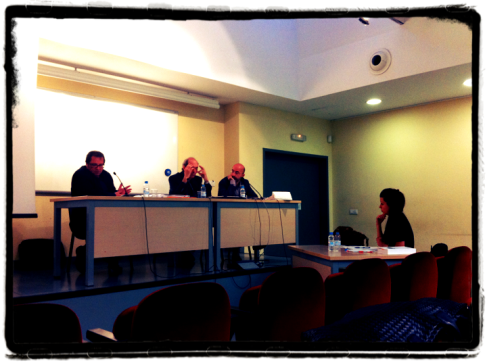This December, 5th, Greti Iuliana Ivana successfully defended her PhD READ ME LIKE AN OPEN (FACE)BOOK! A Social Phenomenological Approach to the Relation between Meaning Constructions on Facebook and the Construction of Ties between Users.
This is the summary of the thesis:
The aim of this PhD. thesis is to explore the relation between the meanings emerging from the exchanges of information on Facebook and the continuous construction of ties between the users who engage in these exchanges. In other words, my focus is on the link between the interpretative processes that unfold in punctual situations on Facebook and the underlying bond between those who are part of an exchange. Assuming the methodological standpoint of grounded theory, I have conducted 40 open ended interviews and observed the Facebook timelines of the interviewees.
From this broad thematic statement, some of the main concepts can already be distinguished. In order to preserve the structure of the thesis, I will provide brief definitions and theoretical guidelines about the ways in which I use these concepts, so that afterwards I can continue with the main threads of the fieldwork. By Facebook users, I mean individuals who have a Facebook profile which they access daily and in which they have published contents at least once after joining. Celebrities, collective pages, product pages etc. are not part of my research. By exchanges of information occuring on Facebook, I understand all types of contents that are shared by one user and received by another, whether it is publicly or privately, commented upon or only viewed. Out of these exchanges, I distinguish two categories: social interactions and non-interactional exchanges. This distinction is based on my approach to social interactions. Drawing on Simmel, Weber and Schutz, I define social interactions as reciprocal action and effects which 1) imply a interconnectedness of lived experiences and a reflective gaze upon those experiences 2) on the basis of the taken-for-grantedness of the other as an intelligible meaning producer and communicator, and 3) are directed towards the other and/or interpreted as such. From this definition, it follows that all Facebook public posts which are not directed towards particular users are non-interactional. The public and private sharing of information that is aimed at someone and interpreted as such is a social interaction.
The two other main concepts I use are “meaning construction” and “ties”. Meaning construction is the process through which subjects make sense of their experiences, both intuitively as part of lived duration, but especially reflectively by turning their gaze towards what “just happened”. This process is conditioned by social regularities and by unique life courses.
Ties are general modes of togetherness, consisting of first hand experiences of social interactions, their meanings for the subject, memories, projections, interpretations of information about the other from other sources etc.
The application of this conceptual apparatus has generated a series if insights into the research theme that are supported by the fieldwork. In Facebook exchanges, the users live in different worlds within reach. Then, the exchange of information can function in two ways: one is the construction of an imaginary about one’s world within reach for the other who does not have access to it, and the other is the construction of a common here and now of the interaction. The common here and now can only emerge on the basis of common experience (i.e. listening to the same song), whereas the imaginary about the other’s here and now emerges as a result of an experience that is lived first hand by only one of the users.
In relation to the actual meaning construction, in non-interactional exchanges, I have made an analytic distinction between strong ties and weak ties, despite the actual fluidity of the categories. Strong ties are: close friends, romantic partners, close friends and partners with whom the subject had a conflict. Weak ties are: acquiantances from one’s past, new contacts and current constant ties lacking depth. In strong ties, meaning constructions are centered around the reconstruction of the other’s lived experience when he/she was apart from the subject (either by continuation of a known plot or the elaboration of a new one). In weak ties from one’s past, contents are read mostly from a panoramic perspective on life courses. With other weak ties, especially if there is a projected strengthening of that tie, information is used for typifications and evaluations. Over viewing and clandestinity are also addressed in this chapter.
In social interactions, more elements come into the meaning construction. In public interactions, the assumed directionality of posts, entitlement, institutionalization of reactions, public complicities, and negotiations of closeness are all attributed meaning in relation with tie strength. In private interactions (particularly with strong ties), the accent falls on the construction of a shared experience in a common here and now.
By outlining the nuances of meaning construction and their relation with different levels of togetherness, I believe this thesis sheds light upon Facebook uses as part of a relational universe.


